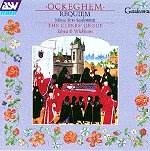This is now one of the foremost small vocal groups specialising in early Franco-Flemish repertoire. Their recordings of Ockeghem have been revelatory and earned them the Gramophone's Early Music Award. It had been a particular pleasure to have attended their London debut in 1992 and several of their concert appearances since then. When possible, they sing gathered around a single facsimile copy from the original manuscript notation.
Eight singers came to the Wigmore Hall with a doubly thematic programme. There was a sequence based upon the song Fortuna disperata including parts of Josquin's Mass based upon it, and a new work by Robert Saxton The Dialogue of Zion and God based upon the same melody set in both Lydian and Phrygian modes. This left an uncertain impression and needs to be heard again, as indeed does the complex music of the period, which often involves two simultaneous texts and complex musico-mathematical devices which are hard to unravel.
The second half was built around the most famous of all chansons L'homme armé, with recent pieces based upon it by Steve Martland, Antony Pitts and Gabriel Jackson. Martland's two Street Songs were fragmented, repetitive and canonic treatments of poor dying Jenny Jones and Oranges and Lemons but again one felt that their ingenuities will have been more fully appreciated by the singers, and they outstayed their welcome a little.
There were two world premieres. Antony Pitts (broadcaster and choral composer) had a Credo from his own L'homme armé with the words in Latin & English, both together. (It is not clear whether that is part of a full Mass setting? Edward Wickham apologised that the (free) notes supplied had been prepared in haste and gone awry in their pagination, which caused some confusion.) Gabriel Jackson's The Armed Man incorporates a moving war poem by Robert Palmer, who died in 1916, and it made the strongest impression of the contemporary works.
But everything else was eclipsed by two sections from Ockeghem's Missa L'homme armé, which reaffirmed by conviction that he is really one of the greats, little appreciated or sung before his quincentenary in 1997. This will presumably be included in the next ASV CD of the ongoing series of Ockeghem's entire sacred output. Meanwhile, I recommend strongly acquisition of at least one of their earlier recordings and suggest [ASV GAU 168 * * * * *].
Peter Grahame Woolf
Further Information and selection of CDs
OCKEGHEM in 1997
(Revised and abridged from review article in The Organ)
Until his quincentenary death year, Johannes Ockeghem's name was better known than his music, except to specialists. Esteemed as pre-eminent in his own time, subsequently he was dismissed unheard until fairly recently as a dry contrapuntist, a clever puzzler. Exposure to his masses in excellent performances and new recordings has proved revelatory. The 1997 Ockeghem celebration is likely to prove far more significant than those the same year for Brahms and Schubert, who will remain popular as ever anyway.
Missa prolationum is famous for its astonishing complexity of pitched and rhythmic canonic devices, with all four 15th century time signatures (prolations) used in a double canon (anticipating Boulez's total serialism?). Abandoning the fruitless attempt to hear all of this analytically, the music proves immensely enjoyable, indeed transparent, when encountered in well prepared performance. The interest is held by changing vocal textures with varied combinations, often cleansing the palate by reducing from four to two strands. It is art which conceals art and speaks easily to our taste, familiarity breeding admiration and affection.
Edward Wickham, musicologist and bass singer, celebrated the quincentenary by participating in a learned and fascinating scholarly disputation about the Missa pro defunctis (the earliest polyphonic Requiem to survive) at King's College in London, followed by a rare opportunity to hear his accomplished team, The Clerks' Group, make light of its difficulties and enchant a large audience with its sheer beauty and unpredictable fantasy. The mass De plus en plus is based upon a Binchois chanson prominent as a cantus firmus in the full four voice sections, with virtuoso passages in between for reduced voices. It can be savoured in an excellent CD by the always reliable Tallis Scholars directed by Peter Phillips, coupled with Ockeghem's Missa Au travail suis, gentle and less overtly demonstrative, each presented with its related chanson [Gimell 454 935-2]. A late arrival for the Ockeghem quincentenary was an excellent Deutsche Grammophon CD of the Missa de plus en plus coupled with a generous selection of secular chansons with fascinating texts, as is so often the case for 15th century music. These use repeating forms, with highly individual cultivation of endless musical lines [DG Archiv 453 419-2 *****]. The extraordinary triple canon Prenez sur moi has the voices each upon different pitches. The four singers of the Orlando Consort are fully competitive, and the presentation is comprehensive, with impeccable recorded sound. Only scholars steeped in the period are in any position to make authoritative comparisons in this rewarding field.
However, the most enduring quincentenary memorial to Ockeghem, revered above all others in his own time, will undoubtedly be the adventurous and universally praised four CDs by The Clerks' Group [ASV Gaudeamus GAU 139, 143, 153 and 168] which span the main output of this composer, despite there being only a limited number of surviving works. These are recorded impeccably, capturing the passion and clarity of the Clerks' Group performances and presented with substantial informative essays and elegant illustrations from the period. For a single CD recommendation, I would suggest [ASV GAU 168 * * * * *], which includes the five part Missa fors seulement from Ockeghem's last decade together with the astonishing Requiem.
P. Grahame Woolf

 Return to:
Return to: